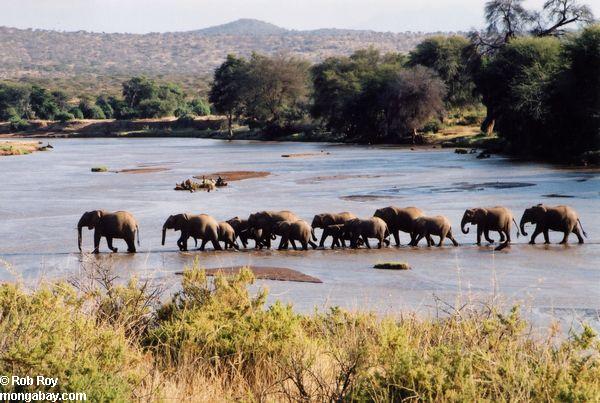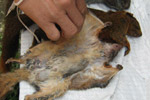On October 8th, the Obama administration will publicly destroy its ivory stockpile, totaling some six tons, according to a White House forum yesterday on the illegal wildlife trade. The destruction of the stockpile—via crushing—is meant to send a message that the U.S. is taking a tougher stand on illegal the wildlife trade, which is decimating elephants across Africa and imperiling other animals worldwide. The U.S. remains one of the biggest destinations for ivory and other illegal animal part aside from East Asia.
“Wildlife trafficking has doubled since 2007, and it’s now estimated to be the fourth largest transnational crime in the world,” Secretary of the Interior Sally Jewell said at the forum.
The Obama Administration has been taking a hard look at the illegal wildlife trade recently as the illicit trade—worth an estimated $19 billion a year—is believed to fund other organized criminal activities such as drug smuggling, human trafficking, illegal arms, and even terrorism. In July, President Obama announced a $10 million to help train wildlife rangers and police officers to combat the trade while he traveled in East Africa.
The forum yesterday was also attended by former Secretary of State, Hillary Clinton, who warned that if poaching rates don’t fall, “African forest elephants will be extinct within 10 years.” African elephants (Loxodonta africana) are currently listed as Vulnerable by the IUCN Red List. However forest and savanna elephants are not distinguished in the listing, though recent research has shown that forest elephants are likely a distinct species.
Experts currently estimate that around 30,000 elephants have been killed annually for their tusks. Poaching of other species, such as rhinos, tigers, and gorillas, has also been skyrocketing.
The U.S. government is also setting up a new advisory council on wildlife trafficking to help assist new efforts moving forward.
“By crushing this ivory stockpile, the U.S. government is sending a signal. If we’re going to solve this crisis we have to crush the demand, driven by organized crime syndicates who are robbing the world of elephants and stealing the natural heritage of African nations,” said Carter Roberts, president and CEO of WWF and a member of the new council. “It’s a global phenomenon. So we hope this encourages other governments to take bold, decisive steps to curb the demand for illegal elephant products.”
The U.S. has been stockpiling confiscated ivory since the global ban in 1989.

Herd of African elephants crossing a river in Kenya. Photo by: Rob Roy.
Related articles
Zoos call on governments to take urgent action against illegal wildlife trade (photos)

(07/24/2013) In a single night in March, a band of heavily-armed, horse-riding poachers slaughtered 89 elephants in southern Chad, thirty of which were pregnant females. The carnage was the worst poaching incident of the year, but even this slaughter paled in comparison to the 650 elephants killed in a Cameroon park in 2012. Elephant poaching is hitting new records as experts say some 30,000 elephants are being killed every year for their ivory tusks. But the illegal wildlife trade—estimated at $19 billion—is not just decimating elephants, but also rhinos, big cats, great apes, and thousands of lesser-known species like pangolins and slow lorises. This growing carnage recently led to representatives of over 40 zoos and dozens of wildlife programs to call on governments around the world to take immediate action on long-neglected wildlife crime.
Smuggler who illegally traded 500 chimps gets one year in prison
(08/27/2013) Wildlife smuggler, Ousame Diallo, who has admitted to illegally trafficking 500 endangered chimpanzees out of the Republic of Guinea, was sentenced to a year in prison in the West African country reports WWF. The arrest and charge was supported by INTERPOL and to anti-wildlife trafficking local group, GALF.
Six smugglers sentenced to jail time over pangolin trafficking in Malaysia
(08/20/2013) Six men have been sentenced to a year in jail after being convicted of smuggling 150 pangolins in peninsular Malaysia, reports Annamiticus. The men were also given fines totaling over $100,000.
Rhino slaughtered for its horn in city park
(08/13/2013) In another sign that the rhino poaching crisis has gone out-of-control, Kenyan officials announced late last night that a pregnant rhino was poached in Nairobi National Park, which sits on the edge of Kenya’s capital. Home to lions, leopard, giraffes and hippos in addition to rhinos, the park is known for its views of iconic wildlife flanked by Nairobi’s skyline.
Scientists discover new flying mammal in bushmeat market

(08/06/2013) The bushmeat markets of Lao PDR (Laos) are filled with racks of wild game harvested both legally and illegally from the surrounding landscapes. While these meat markets certainly provide local protein to patrons, for wildlife biologists they offer something more. These bizarre zoological exhibits are a rich source of information about wildlife populations and wildlife consumption in remote areas.
Elephant killer gets five years in prison in the Republic of Congo
(08/01/2013) The Congolese Supreme Court has ordered Ghislain Ngondjo (known as Pepito) to five years in prison for slaughtering dozens of elephants for their ivory tusks. The five year sentence is the maximum in the Republic of Congo for poaching. Ngondjo was considered the “kingpin” of an elephant poaching group; in addition to killing pachyderms, Ngondjo recruited new poachers and made death threats to park rangers and staff in Odzala National Park.
Obama to take on elephant and rhino poaching in Africa
(07/03/2013) Barack Obama launched a new initiative against wildlife trafficking on Monday, using his executive authority to take action against an illegal trade that is fueling rebel wars and now threatens the survival of elephants and rhinoceroses. The initiative, announced as the president visited Tanzania on the final stop of his African tour, was the second time in a week Obama has used an executive order to advance environmental policy, after announcing a sweeping new climate change plan.